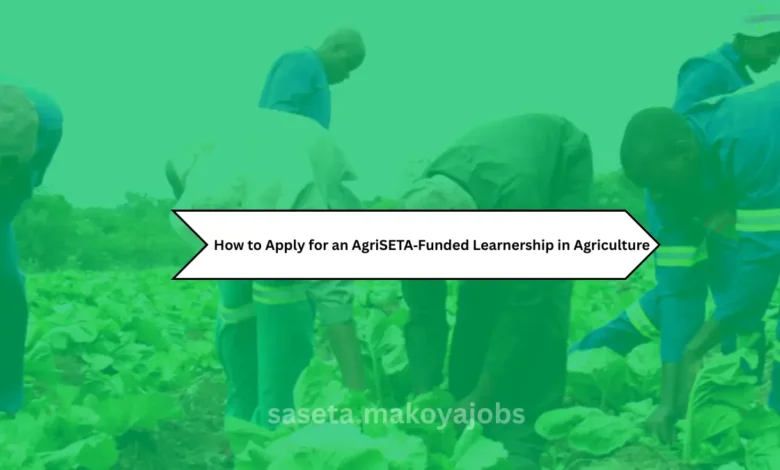How to Apply for an AgriSETA‑Funded Learnership in Agriculture

Learn how to apply for an AgriSETA‑Funded Learnership in South Africa. Get step-by-step guidance, tips, and checklists for successful.
Discover the Opportunity: What Is an Agricultural Learnership?
AgriSETA-sponsored learnerships are structured vocational programmes combining classroom learning and on-the-job training, leading to a SAQA-registered qualification at NQF Level 1–5.
- Most run for around 12 months, though some may be shorter.
- You’ll receive a monthly stipend (often R2 500–R4 200, or higher).
- Employers sometimes offer permanent roles to top-performing learners—but it’s not guaranteed. Still, the experience boosts your employability massively.
Learnership options include:
- Animal Production
- Plant Production / Crop Farming
- Mixed Farming Systems
- Grain Handling Management
- Agri Sales and Service
- Ag Machinery Technician
- Poultry / Seed / Forestry Programmes
2. Are You Eligible?
Zanele checks off the usual requirements:
- South African citizen, ID in hand
- 18–35 years old (typically)
- Completed Grade 9–12 (Grade 12/matric often preferred)
- Unemployed and not enrolled elsewhere
- Clear criminal record
AgriSETA prioritises youth, women, and people with disabilities, so focus on meeting the minimum grade and citizenship criteria.
3. Choose a Programme that Matches Your Passion 🌾
Zanele looks into registered learnerships and is drawn to Plant Production, because she wants to help smallholder farmers increase crop yields responsibly.
You might consider:
- Animal Production if you’re keen on livestock management
- Mixed Farming for exposure to both plant and animal agriculture
- Grain Handling if you’re interested in post-harvest logistics
Local providers like TVET colleges or AgriSETA-accredited institutions often offer placements close to home. Zanele contacts nearby colleges in Gauteng to check current availability.
4. Gather Your Documents
Before applying, Zanele prepares:
| Document | Notes |
|---|---|
| Certified copy of South African ID | Must be dated within the last 3 months |
| Certified Matric / Grade report | If applying for Level 2–4 |
| CV | One or two pages, highlighting passion or experience |
| Proof of residence | Utility bill or local letters (no older than 3 months) |
| Affidavit of unemployment | Some providers require proof you’re not working or studying |
| Medical or disability report | If applicable (for special support routes) |
She keeps both printed and digital copies ready—this flexibility helps when applying online via email and in person too.
5. Apply Through the Right Channel
Depending on the learnership, Zanele either:
- Emails her application to the provider or employer, following the exact subject-line format.
- Or hands in documents at a local labour centre, training provider, or TVET college office if specified.
She also registers as a work seeker at her local Department of Labour, which helps match her with future learnership openings.
Zanele ensures the application name (e.g., “Plant Production Learnership 2025”) is clearly stated—attention to detail counts.
6. Prepare for Assessment or Interview
If shortlisted, Zanele is invited for:
- A basic numeracy or literacy test
- A face-to-face interview or assessment centre
She practices explaining why agriculture matters to her—and how the learnership aligns with her long-term goals. Her clear passion helps her stand out.
7. Sign the Learnership Agreement
If successful, she signs a learnership agreement that outlines:
- Duration and tasks of the programme (theory vs practical)
- Stipend amount and payment schedule
- Behaviour and performance expectations
- Termination policies, if any
This step officially enrols her. Then the learning begins—half on the farm, half in the classroom.
8. Make the Most of Your Learnership
During her twelve‑month training, she:
- Logs her tasks and milestones
- Builds relationships with mentors and supervisors
- Keeps her attendance and performance strong
- Learns both technical farm skills and basic agribusiness practices
Many learners—like Zanele—go on to secure jobs, or even start small agricultural enterprises using their new skills and networks.
9. After Completion: Where to Go from Here?
At graduation, Zanele receives a certificate, showing she’s nationally competent and workplace-ready. Possible next steps include:
- Getting hired by the employer who hosted her
- Applying for another AgriSETA-funded opportunity (e.g. higher NQF level)
- Using her qualification to apply for bursaries or tertiary study in agriculture
- Starting a business—perhaps running permaculture or smallholder farming projects locally
10. Insider Tips to Strengthen Your Application
1. Apply early. Many learnerships open January–March, and deadlines can pass quickly. Early applicants also show commitment.
2. Tell your story. Use your motivation letter or CV to express why agriculture matters to you; it gives you a competitive edge.
3. Follow up. If you haven’t heard back after the closing date, contact the provider—some advertise “no response = unsuccessful” but others may reconsider late or marginal applicants.
4. Check provider accreditation. Make sure any training institution is currently listed on AgriSETA’s accredited list.
5. Prioritise digital copies. Some providers now prefer online applications—having well‑scanned files makes a good impression.
Summary: Zanele’s Path in Review
- Discover your desire—pick a learnership aligned with your interest.
- Meet eligibility—SA citizen, correct age, right grade level, unemployed.
- Prepare your story—gather certified ID, CV, school results, and proof of residence.
- Apply correctly—via email or in person, using prescribed formats and contact info.
- Excel in assessments—be confident and ready for literacy/numeracy tests or interviews.
- Complete and absorb—learn theory, practice on farms, and network.
- APPLICATION PROCESS
- Launch into your future—whether employment, further training, or business.
Final Thoughts
Agricultural learnerships are more than just entry-level programmes—they’re launch pads for careers in farming, agribusiness, food production, and rural development. Featuring practical experience, a stipend, and a nationally recognised qualification, they offer a strong foundation for anyone wanting to grow in this vital sector.
If you’re like Zanele—eager to learn, ready to work, and drawn to the land—begin your journey today. Explore your options, gather your documents, and take that first step.
Your harvest season is waiting. 🌾





